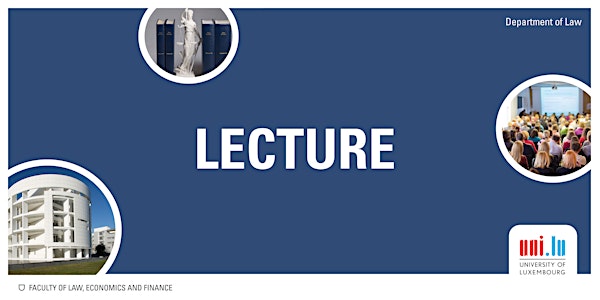
The Foreign Subsidies Regulation
The Foreign Subsidies Regulation: The External Dimension of EU Competition Policy
Date and time
Location
University of Luxembourg - Weicker Building
4 Rue Alphonse Weicker 2721 Luxembourg LuxembourgAbout this event
- Event lasts 2 hours
Lecture Series The European Union as Global International Actor: strategic autonomy in a changing international context
The Department of Law of the Faculty of Law, Economics and Finance of the University of Luxembourg, with the support of the Luxembourg National Research Fund and the Erasmus + Programme of the European Commission, and in collaboration with the Luxembourg Centre for European Law, is organising this lecture.
Prof. Wolfgang Weiß, German Unversity for Administrative Sciences Speyer
(Supported by the Luxembourg National Research Fund, RESCOM/2024/LE/18832235 and the Erasmus + Programme of the European Union, ERASMUS-JMO-2024-HEI-TCH-RSCH)
Opening: 11h45
A lunch will be served on site.
Abstract
Regulation 2022/2560 on foreign subsidies distorting the internal market is a new piece of legislation that follows the reorientation of the EU's trade policy in 2021 in the pursuit of greater strategic autonomy. The regulation aims to provide the EU with the necessary tools to counter distortions of competition in the internal market caused by subsidies from third countries. It aims to ensure a level playing field for all companies operating in the EU. As the remedies provided for in the FSR also affect the internal market behaviour or presence of foreign companies operating in the EU and thus have an impact on the EU's external trade, the new legislation is a mixture of trade and competition policy. The first experiences with the application of the FSR confirm that the new instrument raises a number of interpretive, conceptual and practical questions. While the rationale for this new legislative instrument is perfectly understandable, there are considerable doubts as to whether this Regulation is the right way to achieve a more level playing field. Critics argue that the Regulation achieves its objective of ensuring a level playing field only by creating new bureaucracy, by giving the European Commission broad powers and a very wide margin of manoeuvre on the basis of extensive and complex assessments, and by introducing considerable legal uncertainty and unpredictability as a result of undefined legal terms. Whether the Regulation can really be seen as an instrument for fairer competition in the EU's internal market will therefore depend to a large extent on how the rules are applied in practice by the Commission (also in the light of EU constraints arising from EU obligations under WTO and FTA rules) and how the third countries concerned react, as the FRS may trigger a new spiral of discriminatory behaviour.
Speaker
Prof. Dr Wolfgang Weiß holds the Chair in Public Law, Public International Law and EU Law at the German University of Administrative Sciences in Speyer/Germany. Before, he was professor of public law and of international law at the University of Erlangen-Nuremberg and the Oxford Brookes Unversity. His main areas of research are the Law of the European Union, European Economic Law and International Economic Law. His most recent books are: Open Strategic Autonomy in EU Trade Policy (Cambridge University Press, 2024; together with Cornelia Furculita) and The Regulation on Foreign Subsidies Distorting the Internal Market. A Path to a Level Playing Field? (Springer, 2024)
Location
University of Luxembourg
Campus Kirchberg - Weicker Building
Room A401 (fourth floor)
4, rue Alphonse Weicker, L-2721 Luxembourg
Language
English
RESCOM/24/18832235
The European Union as global international actor: strategic autonomy in a changing international context
Past Lectures
27 January: Greening International Investment Law, Prof. Joanna Lam, University of Copenhagen. Discussant: Dr Günes Ünüvar, Luxembourg Centre for European Law (LCEL)
10 March: European Strategic Autonomy and European Values in the Context of Crisis, Prof. Federico Casolari, University of Bologna. Discussant: Prof. Ramses Wessel, University of Groningen
4 April: Digital Strategic Autonomy in the EU’s External Action, Prof. Elaine Fahey, City University of London. Discussants: Prof. Stefan Braum, University of Luxembourg, Prof. Herwig Hofmann, University of Luxembourg
8 May: Protecting EU Interests: The Unilateral Turn in EU Trade and Investment Policy, Prof. Isabelle Van Damme, World Trade Institute and University of Bern. Discussant: Dr. Thomas Verellen, Utrecht University
19 May: Facing the Security Challenge, Prof Isabelle Bosse Platière, University of Rennes, Discussant: Prof Peter Van Elsuwege, University of Ghent, Dr Luigi Lonardo, University College Cork
Upcoming lectures
16 June: Sustainable Development and Strategic Autonomy in the EU’s Bilateral Relations, Prof Francesca Ippolito, University of Cagliari, Dr Jed Odermatt, City University of London
The University of Luxembourg (hereafter “Uni.lu”) collects and processes your personal data in the framework of your registration and your participation in this event and the communication of its future activities. Uni.lu processes and keeps your personal information only to the extent necessary to fulfill the purpose stated.
During the registration process your personal data is being collected and processed on the Eventbrite website by Eventbrite Inc. located in the United States. This will involve the transfer of personal data to countries that do not offer the same level of protection as the European Union regarding data protection rules. Eventbrite Inc. participates in and complies with the EU-U.S. Privacy Shield framework as set forth by the US Department of Commerce regarding the collection, use and retention of personal data. Eventbrite may process your personal data as a controller for different purposes than the purposes of the University of Luxembourg. More information is provided on Eventbrite Inc.’s website in their EU-US Privacy Shield Notice, Privacy Notice and Terms of Services.
You can deregister from the event directly on the Eventbrite website and withdraw your consent for the processing of personal data by Uni.lu for the purpose stated above. You have the right to access, rectify, and erase your personal data as well as further rights described on the Uni.lu website. You can exercise your rights by following the procedure described on the website.